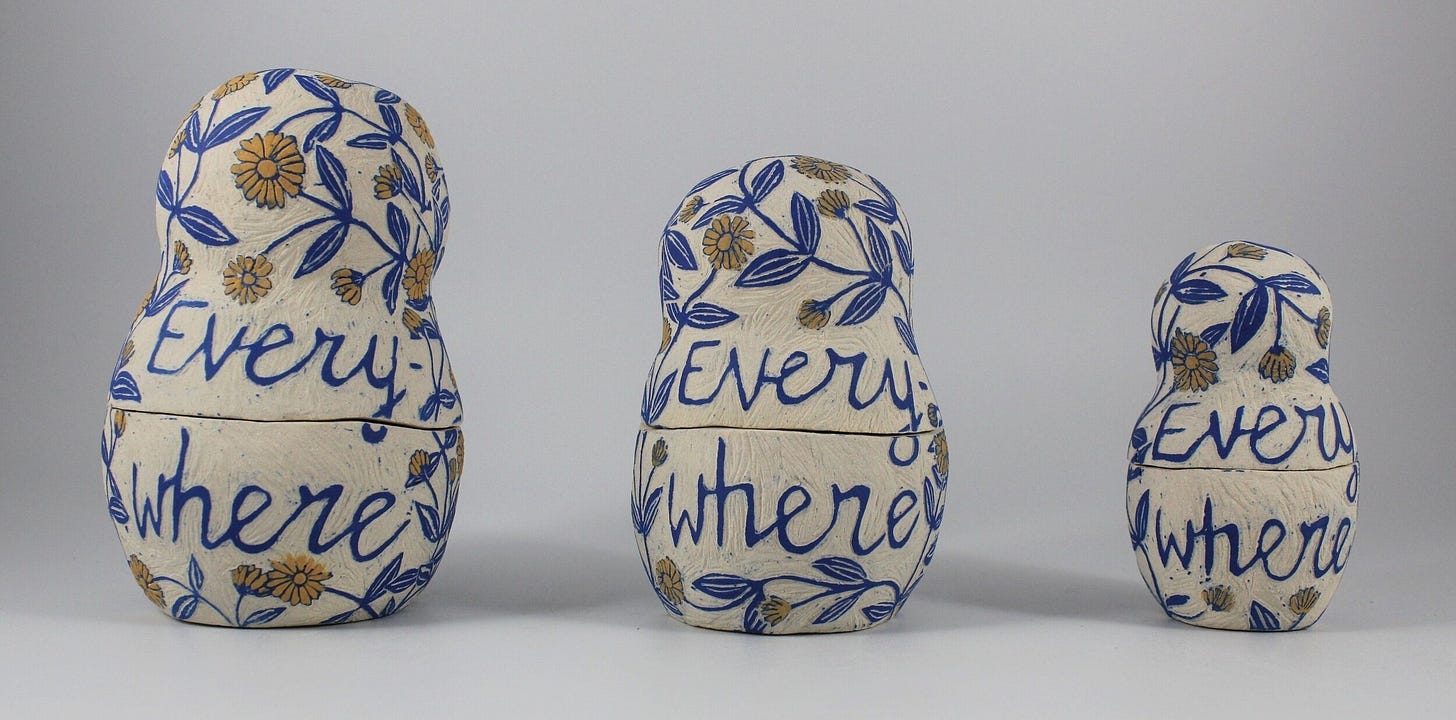CPC guest post: Creativity and the cost of emotional convenience
Today's guest post is by Danusia Malina-Derben from Parents Who Think
Good morning and welcome back to Creative Parenting Club. We hope you’ve had a good week.
As promised, we're back again today with our latest guest essay: this time from — boardroom strategist, author, award-winning podcaster, mother of ten and writer/curator of the brilliant Substack .
We first connected with Danusia after we put out a call recently for guest collabs, and got quite the response 😅
Given all the ways that we are hoping this community can connect and inspire creative parents, Danusia left a comment that stuck with us:
Let’s flood this space with all the ways parenthood and creativity actually collide. Not just the glossy bits. The real stuff. ❤️🔥
We enthusiastically responded that we are all about the real stuff here at CPC, and that got the conversation going.
Whatever your family setup looks like, we hope you’ll find Danusia’s essay to be as real and as eye-opening as we did.
Be sure to tell us what you think!
Be our guest
Before we get to the good stuff, we also wanted to give one more quick shoutout to everyone who responded to our writer call. We’re pleased to say we’ve got a lot of other exciting guest content coming your way throughout the summer, and a lot of cool interviews planned as well — including a follow-up pod with Danusia herself.
If you were one of the 100+ commenters to our post and we haven’t gotten back to you yet, please feel free to send us a DM! As creative parents with day jobs, we’re doing our best.
And if you missed our call for guest collabs (or aren’t as engaged on Substack), please also feel free to reach out to us at any time by replying directly to any of our emails.
Our goal is to be a space that amplifies the creative work of parents, and we are committed to featuring a wide range of perspectives. So if you’d like to take your turn in the spotlight, please know that your voice is always welcome.
Thanks for being here, and enjoy this week’s guest essay.
Creativity and the cost of emotional convenience
By
,Turns out, clearing emotional clutter isn’t just self-care. It’s creative fuel.
—
I’ve been a mother since I was seventeen. I’ve never known adulthood without children. And I’ve never known a single creative pursuit without interruption.
So I am wary of the way we might frame motherhood and creativity as opposing forces, as if raising humans is inherently a thief of brilliance.
What if the real question isn’t whether parenting limits creativity, but whether heterosexual partnership does?
Here’s where it lands for me. There’s a theory I’ve been turning over lately, one crystallised by something a client1 said:
“All the most productive, creatively successful women I know are single, and many of them also happen to be solo mothers.”
There was no edge to it. Just quiet recognition, said out loud.
And it struck me because it echoed something I hadn’t quite put words to publicly: the further I moved from emotional caretaking of a male partner, the more I could hear myself think.
This isn’t a takedown of men2 (or of partnership). It’s an audit of emotional labour.
I don’t write this as a casual observer. I write as the mother of ten children, yes, but also as the author of books on both motherhood and fatherhood identity. I’ve surveyed thousands of fathers and mothers. I’ve sat with the data, the grief, the patterns. And what I know is this: these aren’t personal anomalies. They’re systemic defaults.
“Creative women aren’t blocked by the work of motherhood. They’re blocked by the expectation to be everyone’s emotional safe house.”
-Danusia Malina-Derben
The quiet architecture of domestic life is propped up by women’s unspoken vigilance—the tracking, soothing, anticipating. It’s part of the economy of attention, where women’s focus becomes the resource everyone else relies on to function.
Who holds the relationship anxiety? Who tracks the moods, the silences, the simmering needs? Who anticipates and absorbs? Who makes space for everyone else’s ‘process’ before even approaching their own?
It’s not intimacy that drains me. It’s cohabiting under gendered norms.
Because I co-regulated the emotional climate of the whole household. Which is a poetic way of saying: I was the bloody thermostat. Everyone else just reacted.
Single, I’m responsible for everything but I’m no longer splitting my attention three ways3: between myself, a partner, and the constant upkeep of the relationship that binds us.
The paradox of single motherhood is that while the work multiplies, the drain often doesn’t. My time isn’t ‘free’, but my creative mind is.
But this didn’t happen overnight, this creative abundance didn’t appear the moment I became single. I’ve been partnered. I’ve raised children within relationship. I’ve also raised them alone.
“What I know now is this: the shift didn’t come from circumstance alone. It came from withdrawing my energy from the endless task of tending someone else’s emotional climate. That’s what changed the creative math.”
-Danusia Malina-Derben
Because I create more now. I finish more. I know what I want to say, and I have fewer interruptions to the internal rhythm it takes to say it. That rhythm, the private pulse of a creative mind, isn’t broken only by noise. It’s broken by invisible duty. The kind of duty that says: respond to his need first. Notice his distance. Smooth his edges.
What’s rarely said aloud about many domestic partnerships is that they are soft prisons for women’s attention.
So no, I’m not romanticising struggle. I’m naming the cost of emotional convenience. And who it’s usually designed for. And whose creativity it affects.
It’s time we asked whether some mothers become their most creatively potent not despite being single, but because of it.
That doesn’t mean singlehood is a prerequisite for creativity.
But it does mean we have to ask: what does it take to protect a woman’s interior world? Her bandwidth? Her brilliance?
As you read these words, you might be parenting solo. You might be deep inside a long-term partnership. You might be somewhere less defined.
Wherever you are, here are a few questions I’m sitting with, not as answers, but as invitations. I hope they offer something worth mulling over:
What would it take to not be your household’s emotional concierge, without burning the whole house down?
Where do you outsource support so your creativity can survive, and what does it cost?
What conversations do you avoid for fear these will disturb the peace?
If your attention belongs to you first, what will you make room for?
Where are you offering yourself permission, not pressure, to create?
What small systems or rituals are holding you up? What needs rebuilding?
Who do you trust with your mess, your drafts, your truths-in-progress?
What would it feel like to create without apology, even before the conditions are perfect?
You don’t owe anyone a masterpiece. But you do deserve room for your creativity.
In the end, it’s not about choosing solitude or partnership.
It’s about choosing truth. The kind of truth that lets you hear your own voice clearly, create without apology, and parent without vanishing. May we each find our way (back) to that room inside us where the work starts and the self doesn’t shrink.
I am committed to crediting the source of material that I later weave into my work. I am also committed to keeping the identity of clients confidential. Huge thank you to this client who will recognise her words.
As the mother of six sons, disliking men is hardly my agenda. But critiquing systems that advantage men—as a gender, as partners, as creatives—is part of the work. It’s not men I question. It’s the scaffolding that lets them stay so often unburdened.
The kids are a given.










Really enjoyed this post. One of the things I wrestle with a lot as a papa is when to be stoic/“strong for my family” (whatever that means in any given moment) compared with when to open up and be vulnerable. I suspect I’m not the only modern dad thinking about this 😆😅
Curious if you have any tips on how we men can shoulder more of the emotional load without closing ourselves off? As I’m writing this I realize maybe that’s a silly question.
I guess the historical irony is that even with all the socially damaging repercussions of men thinking we are bearing the burden by suppressing our emotions, it’s actually our partners who have been keeping the family’s emotional ship afloat.
One more strike against trying to hold it all in.
Thanks again to Danusia for an amazing and thought-provoking read 🙌🙌